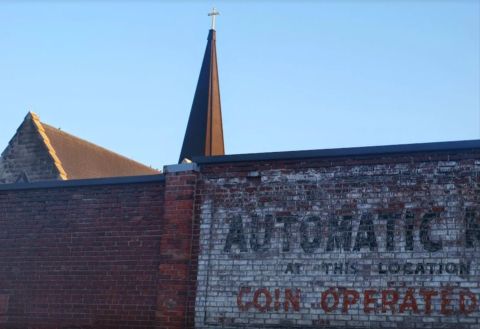Jerry Wemple
The World’s Tiniest Memorial Day Parade Marches Down Pearl Street in Johnson, Vermont
Despite the seven men of American Legion color guard,
the high school kids’ snare drums and tuba,
one antique fire truck,
and five Cub Scouts with one of the fathers marching alongside,
this poem is longer than the parade.
Luxury
This is the corner store, years gone now, where Mae, her left leg an inch and quarter shorter than the right, would hobble up the narrow and uneven wood floor aisles. She’d fill an order for a kid with mismatched shoes sent, note in hand, on a mother’s errand. Then another for the Camerons, old folks from across the street too infirm to make the seven-block trek uptown to the supermarket. The Stroehmann’s bread push bar, tacked to the wood-framed screen door back before Mae ran the place, is faded from years and use. A lighted Hershey’s Ice Cream sign, turned on in the dusk hours, hangs in the right-side window. On the left are the week’s advertisements printed on rectangles of thin white cardboard: Lebanon bologna, butter, and heads of lettuce are all on special. Just inside the left window, partially hidden by the rack of chips and pretzels, sits the old dark blue metal floor cooler. Once, when you were four, maybe five, your great-grandfather gave you a coin and let you walk a half block down the alley to the store. Your great-grandfather is old, older than Mae, older than the Camerons. You know his name is Jesse, but everyone calls him Poppy. He is the last German speaker in your family, and sometimes says things you do not understand, but when he talks to you, he leans in, like it is a secret, and you understand well enough. After you reach the store, you slide open the hefty lid of the cooler, rummage in its chill and dampness until you find a tall bottle with ridges and a red and white symbol: RC Cola. You give Mae the coin and walk back up the alley, the bottle cold and substantial in your hands. Poppy uncaps it for you, and you sit in a chair next to his in the front yard, feet dangling in the air, while you drink. And now, with all that has come to pass, you understand that those frozen moments are luxury.

Coda
She pulled up in a big-ass van. You’re reminded of the green Dodge window van she had when you moved back from Florida the summer you turned sixteen. How she let you take it and a bunch of kids, mostly cousins and neighbors, over the bridge to the McDonald’s on the highway despite you being a new driver. Even threw in cash to get everyone something. Said to bring her back a vanilla shake. That was years ago. Now your own kids are grown and gone. You haven’t seen her in thirty years, maybe more. The week before, you got in touch, asked for this meeting. She picked another fast-food joint. This one out on the interstate. You want to give it one more shot because no one lasts forever; this time, this one last time, you’ll ask her directly. You’ve heard a lot of stories over the years, all incomplete and disjointed: all unsatisfactory. As she settles into the booth you think she looks decent for eighty, wonder if you’ll be slow to show your age too. You notice her colored and permed hair, that she’s a bit heavier than you remembered. Still, she has the same energy in her step, and those quick calculating and guileful glances, a look that’s common among a strain of your relatives. Full of the devil your grandmother used to call it. The conversation sputters off in odd ways. She tells you about her third husband who died a few months back. You never met him, wonder if he even knew about you. The happy-yellow color of the booth’s table and benches is disconcerting, makes you angry. The coffee is rancid, so when she goes to fetch a refill, you know that she is stalling. When you get to the heart of the matter, she is smooth, holds the tears until a couple of minutes into the story. Coming off a late shift at a diner, locked out of the house by a drunken husband, she made her way around the back to look for an open window when a man with a foreign accent attacked her. She took her car and drove straight away, fleeing Baltimore and returning three hours north to Pennsylvania. She issues a denial when no accusation has been lodged. People said I had an affair, she says in a lean-in whisper. It’s not true. She dabs her left eye with one of the coarse paper napkins she’d already fetched from the dispenser on the counter. She makes no mention of the “colored guy” who other relatives say called after her for months once she returned to Pennsylvania, the rumor of another relative who posed as the father, signed you over to the orphanage. You’ve done the math; you understand. She was young, living in a different time, a world faded into a ghost memory. You don’t begrudge her that. It’s the years of deceit that have haunted you both until this very moment, lifelong afflictions. You had come in search of your father, but you saw that he would not be forthcoming, not there, not that day. Within a year she gets sick, lingers in the hospital for weeks, and then dies. You do not visit her nor go to the funeral.